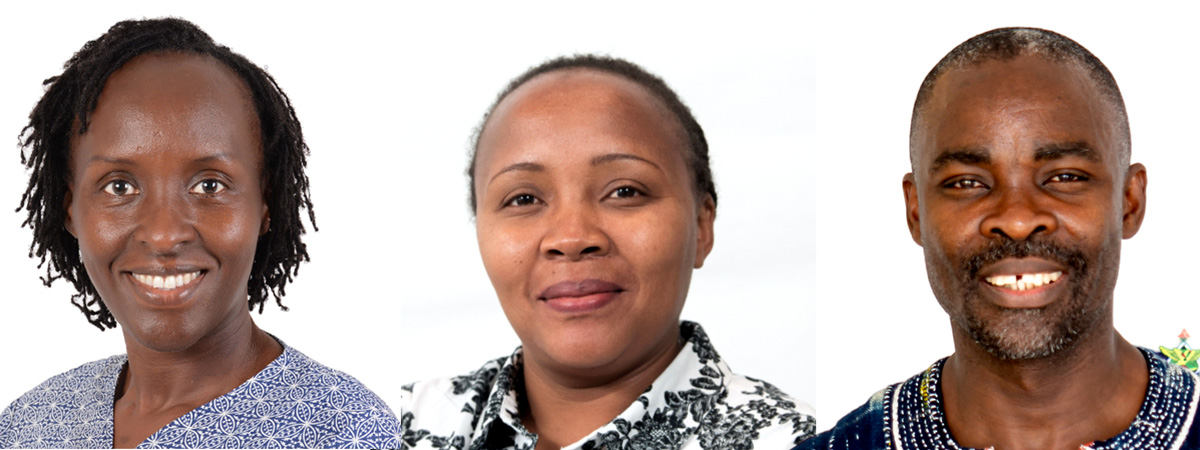
Consortium leaders, Dr. Gladys Nyachieo, Dr. Josephine Malonza and Dr. Gift Dumedah.
The Volvo Research and Educational Foundations (VREF) is excited to announce the establishment of three African Research Programs (ARP-MACs) within its “Mobility & Access in African Cities” (MAC) program.
This announcement follows a competitive call for applications issued in 2023, inviting researchers from Sub-Saharan Africa (SSA) to propose three-year African Research Programs (ARP-MACs) for carrying out state-of-the-art research in thematic areas relevant for achieving sustainable mobility and access in African cities. By ARP-MACs are meant cohesive research programs, under which multiple research projects are implemented in multi-university consortiums, often in collaboration with relevant stakeholders.
The thematic areas of the call focused on approaches to enhancing equitable and reliable access to livelihoods and essential services; understanding governance and planning dynamics of urban mobility; and exploring new service options within informal transport.
Three proposed programs have been approved by VREF’s Board. Each ARP-MAC is expected to be operational under the three-year period 2024-2026. The three consortiums are now set to begin their operations, in which they will not only advance research but also foster interdisciplinary collaboration and engagement with multiple stakeholders.
VREF is proud to publicly present these three ARP-MACs and looks forward to following and supporting their exciting work!
Governing Urban Mobility: Making and Implementing Decisions in Transport in Sub-Saharan Africa (MID-UTA)
This ARP-MAC focuses on understanding decision-making and governance in urban transport planning, specifically within three sectors: paratransit (such as minibuses/matatus, motorcycle taxis), public transport (such as busses, rail, Bus Rapid Transit), and walking. Recognizing that there is a significant knowledge gap in this area, the program aims to generate and share insights on how decisions in these sectors are made and implemented in Sub-Saharan African cities.
Consortium leader
Dr. Gladys Nyachieo
Host institution
Multimedia University of Kenya
Main partner organizations
University of Cape Coast (Ghana), Kyambogo University (Uganda), Redeemer’s University (Nigeria), University of Birmingham (UK), and World Health Organization (Switzerland)
The program has four main objectives:
- to generate and disseminate knowledge on urban transport decision-making in Africa,
- to enhance academic collaboration and build capacity among scholars in urban transport and mobility
- to foster partnerships between relevant state and non-state actors in this area, and
- to create a sustainable research platform to convene urban policymakers, practitioners and scholars.
The ARP-MAC will be built around three main thematic streams which will combine scientific work with community building activities:
- decision-making and implementation processes,
- power and politics,
- planning, attitudes, and behavr (including barriers which actors experience in their decision making)
The various projects within the program will explore crucial issues regarding the actors involved in decision-making, the ways in which these actors influence and shape decisions, and the barriers they face (as well as how these barriers are overcome).
MID-UTA will also focus on building capacity among next generation scholars through workshops and summer courses, as well as by embedding issues related to transport planning and governance into formal educational offerings on the continent, thus ensuring a lasting impact on transport planning education in the region. Additionally, an important long-term ambition is to strengthen the participation of African scholars in the global academic community.
Popular-to-Popular Transport Integration in Sub Saharan Africa: Case of Rwanda and Ghana (POINT)
This ARP-MAC addresses the theme of equitable, affordable, and reliable access to livelihoods and services in African cities. The goal is tosupport research and policy towards integrating popular transportation modes—such as minibuses, motorcycle taxis, and walking—into urban planning as a means of enhancing the quality of life for urban residents, especially marginalized groups.
Consortium leader
Dr. Josephine Malonza
Host institution
University of Rwanda
Main partner organizations
Kwame Nkrumah University of Science and Technology (Ghana), University of Oxford (UK), and Aalto University (Finland)
The point of departure for the program’s approach is that while there is a growing recognition of the importance of these popular transport systems, existing efforts tend to focus on integrating specific modes into formal transport systems. At the same time, integration between and among popular transport modes offers the most potential to deliver more equity and reduce transport-related social exclusion among disadvantaged populations and communities.
The consortium will employ a decolonial systems intelligence framework to analyze mobility practices, experiences, and adaptation strategies of residents in selected cities in Rwanda and Ghana. An important aim is to explore how to overcome barriers to equitable access and improve infrastructure configurations that benefit underserved neighborhoods.
Key activities will include stakeholder engagements and the development of policy papers to promote the integration of popular transport systems. Through this program, POINT also aims to support next generation scholars and establish a sustainable research network to drive transformative changes in urban mobility in Africa.
Equitable Transport Access and Mobility in African Cities (ETAMAC)
This ARP-MAC focuses on issues related to transport-related equity, specifically in paratransit and non-motorized transport (NMT) systems and services in African cities. Transport-related equity will be explored through three sub-themes: universal access to opportunities, efficiency of transport systems and services, and health and safety. The overarching goal of the program is to explore ways in which existing transport-related inequities can be mitigated in African cities, as well as to examine the socioeconomic costs and benefits of doing so.
Consortium leader
Dr. Gift Dumedah
Host institution
Kwame Nkrumah University of Science and Technology (Ghana)
Main partner organizations
University of Pretoria (South Africa), University of Dar es Salaam (Tanzania), University of Tara (Togo), University of Education, Winneba (Ghana), and University of Alabama (USA
The point of departure for the work is an understanding that challenges related to equitable access must address crucial issues such as spatial inequalities and economic affordability, gendered differences in mobility needs (as well as among those with different abilities and cultures), and exposure to health impacts of pollutants, crashes and transport-related crimes.
The program has three main objectives:
- to create new knowledge about – and develop innovative strategies to address – transport-related equity in the domains of access, efficiency, and health and safety in African cities,
- to create and share scholarly research in this area, among else by developing an online course for integration in university curriculums,
- to develop the capacity of next generation scholars by creating educational programs and materials to address transport-related equity issues
ETAMAC will initially focus on selected cities in Ghana, Togo and Tanzania, where an important goal of the program is to create and communicate direct, actionable policy guidance that is conducive to achieving equitable access. A core, long-term ambition is also to establish Africa as a hub for, and leader of, research and education on equitable transport.

